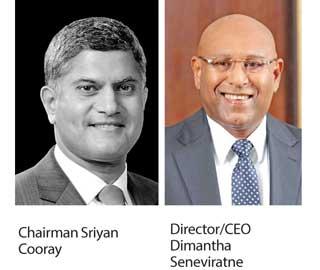15 Nov 2022 - {{hitsCtrl.values.hits}}
The massive provisions made on account of possible loan defaults and investments in dollar bonds of the government resulted in National Development Bank PLC (NDB) making a loss in the three months through September 2022 (3Q22) as the bank readies to further calibrate its near-term growth targets to reflect the evolving macroeconomic challenges.
The development lender-turned fully-fledged commercial bank reported a net interest income of Rs.7.32 billion for the July-September period, up 31 percent from the same period last year, as the bank judiciously managed its assets and liabilities to enhance returns amid the surge in interest rates.
 The bank saw its net interest margin expanding to 3.78 percent, from 3.25 percent at the beginning of the year, despite the increase in the interest expense, outstripping the increase in the interest income by as much as 60 percent.
The bank saw its net interest margin expanding to 3.78 percent, from 3.25 percent at the beginning of the year, despite the increase in the interest expense, outstripping the increase in the interest income by as much as 60 percent.
The bank provided Rs.8.29 billion against possible bad loans and other financial assets denominated in foreign currency for the quarter, compared to Rs.2.50 billion in the same period in 2021, as the economy collapsed in March, sending interest rates through the roof, adding stress to the borrower while prompting the government to default on its foreign currency debt.
This was large enough to erase the profit and flip the bank into a loss of Rs.1,083.46 million or a loss per share of Rs.2.85 for the three months through September, compared to the earnings of Rs.1.87 billion or Rs.6.78 a share in the corresponding period last year.
This was large enough to erase the profit and flip the bank into a loss of Rs.1,083.46 million or a loss per share of Rs.2.85 for the three months through September, compared to the earnings of Rs.1.87 billion or Rs.6.78 a share in the corresponding period last year.
The fee and commission income also declined by 9 percent to Rs.1.64 billion in the quarter from a year ago, reflecting muted lending activity in the quarter, as the banks tightened credit standards, effectively closing their lending taps to minimise the fallout from defaults that arise from any new lending extended in an economy, which remains out of kilter.
Despite the runaway inflation, the bank managed to contain its operating expenses growth to 8 percent, reflecting the rigorous cost containment measures.
Meanwhile, the bank reported a net trading gain of Rs.438.76 million for the quarter, down 51 percent from a year ago while the other operating income was recorded at Rs.225.1 million, up 233 percent, predominantly attributed to the revaluation gains on the bank’s foreign currency-denominated reserves, due to the sharp depreciation of the rupee against the US dollar. Commenting on the performance, the bank’s Director and CEO Dimantha Seneviratne identified the conditions confronted by the country and the bank as unique and unprecedented. The bank expanded its total loan book by Rs.74.1 billion or 14 percent in the nine months, which includes the impact coming from the translation of the foreign currency loans after the rupee collapsed earlier this year.
The rupee loans grew by Rs.26.9 billion or by 6 percent. The bank’s impaired or non-performing loans ratio stood at 5.75 percent, slightly increased from 4.55 percent at the start of the year. Meanwhile, the deposits grew by 18 percent or Rs.97.3 billion, although the rupee deposits grew by only 5 percent or Rs.20.8 billion. Norfund, the Norwegian Investment Fund for developing countries, has a 9.99 percent stake in the bank while the Employees’ Provident Fund held a 9.50 percent stake, being its second largest shareholder.
06 Nov 2024 1 hours ago
06 Nov 2024 1 hours ago
06 Nov 2024 1 hours ago
06 Nov 2024 2 hours ago
06 Nov 2024 2 hours ago